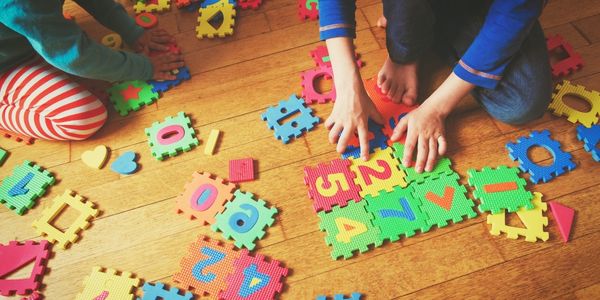What is a Child Life Specialist? Helping Kids Cope with Medical Crisis
By Ashley Brooks on 03/14/2016
Going to the hospital is a scary experience for most people but especially for children. More than three million children in the U.S. are hospitalized each year, according to the Connecticut Hospital Association.

It’s common for those children to experience trauma due to their hospitalization. Imagine being rushed to an unfamiliar building, being surrounded by strangers, not knowing what’s wrong with you and possibly being separated from your parents during a scary medical procedure!
Luckily, many medical facilities are combating the stress of childhood hospitalization by employing child life specialists to work with these families. These trained professionals are there specifically to support children and their families as they deal with the emotional and physical stress of hospital stays and medical procedures.
Child life specialists truly make a difference to the families they serve. As someone with a passion for young children, this could be the perfect use of your skills and abilities. But to help you decide, we’re giving you all the answers you need to the question, “What is a child life specialist, anyways?”
What is a child life specialist?
“Child life specialists are experts in child development who promote effective coping through play, preparation, education and self-expression activities,” according to the Child Life Council (CLC). These professionals are a hybrid of child development advocate and counselor who helps children and their families navigate the tough waters of hospitalization and long-term medical care.
A child life specialist’s primary job is to reduce stress in children and to help them understand any medical procedures they’ll be undergoing. They also provide emotional support for families and siblings, take steps to encourage typical child development and educate the medical community about the negative effects of stress on children.
Where do child life specialists work?
Child life specialists are most often found in children’s hospitals or hospitals with large pediatric departments, according to U.S. News. Though some child life specialists may work wherever they’re needed in the hospital, others will be assigned to a specific unit, such as the ER or intensive care.
However, child life specialists aren’t restricted to hospitals. Some programs are now allowing their child life specialists to travel wherever children may need their support. They may go to a child’s school to explain why he or she has been absent and answer any student questions. Or they might offer support at a doctor’s appointment or funeral. “Whatever the location, child life interventions focus on the individual needs of the child and family,” according to the CLC.
What are a child life specialist’s job duties?
As you can imagine, a child life specialist spends much of their day interacting directly with children and their families. These are the duties a child life specialist will encounter in a typical day, according to the CLC and Hand to Hold:
- Helping children prepare for surgery or other medical procedures.
- Giving hospital tours and providing information about a child’s hospital stay.
- Explaining complex medical jargon in language children can understand.
- Offering therapeutic play with dolls, stuffed animals and/or medical equipment.
- Encouraging activities that support children’s development.
- Coordinating special events, celebrations or therapies, such as pet therapy.
- Supporting siblings and preparing them for visiting their brother or sister in the hospital.
- Suggesting resources or community groups to further support children and their families.
- Educating the community on the needs of hospitalized children and their families.
- Offering bereavement counseling.
Child life specialists who work in a specific medical department may have additional job duties. For example, a NICU child life specialist may counsel parents on creating a legacy of their baby’s short life. Or a child life specialist working in the ER may help distract a child from a scary or painful medical procedure.
How do you become a child life specialist?
Currently, you can become a child life specialist by holding a bachelor’s degree in any field and passing a certification exam. However, this requirement is changing. By 2025, all child life specialists must achieve an advanced degree in child life, according to the CLC.
2025 is still a long way away. If you’re interested in becoming a child life specialist today, follow these steps laid out by the CLC to become eligible for the certification exam before 2019:
- Successfully earn a bachelor’s degree in any field.
- If your bachelor’s degree was not earned through a CLC-endorsed undergraduate program, you must also complete at least one child life course taught by a certified child life specialist and nine college courses in a child life-related subject.
- Gain at least 480 hours of clinical experience in child life.
- Pass the Child Life Professional Certification Exam.
Bachelor’s degrees that may include courses that relate to child life specialists include early childhood education, child development and psychology, among others.
What’s the job outlook for child life specialists?
The child life profession is a growing field, according to the CLC. Most child life specialist jobs still center around hospitals, but the demand for these caring professionals could rise as other medical facilities, schools and even funeral homes begin to recognize the importance of this profession.
The average annual salary of a full-time child life specialist in 2012 was $41,720, according to the CLC’s 2012 Child Life Profession Compensation Survey.* There is also room for advancement in the child life field, with opportunities to gain leadership responsibilities and become the manager or director of a hospital’s child life program.
Is this your calling?
Now that you know the answer to “What is a child life specialist?” you can see that it takes a special person to pursue this challenging yet rewarding field. This could be your chance to apply your experience in child development towards a growing healthcare career.
If you’re ready to make a difference in children’s lives in a whole new way, learn more about how a degree in early childhood education can help you acquire the knowledge and training you need to get started.
RELATED ARTICLES:
- Is a Career in Child Development Hard? Teachers Tell All
- What Can You Do With an Early Childhood Education Degree?
*Salary data represents national, averaged earnings for the occupations listed and includes workers at all levels of education and experience. This data does not represent starting salaries and employment conditions in your area may vary.




